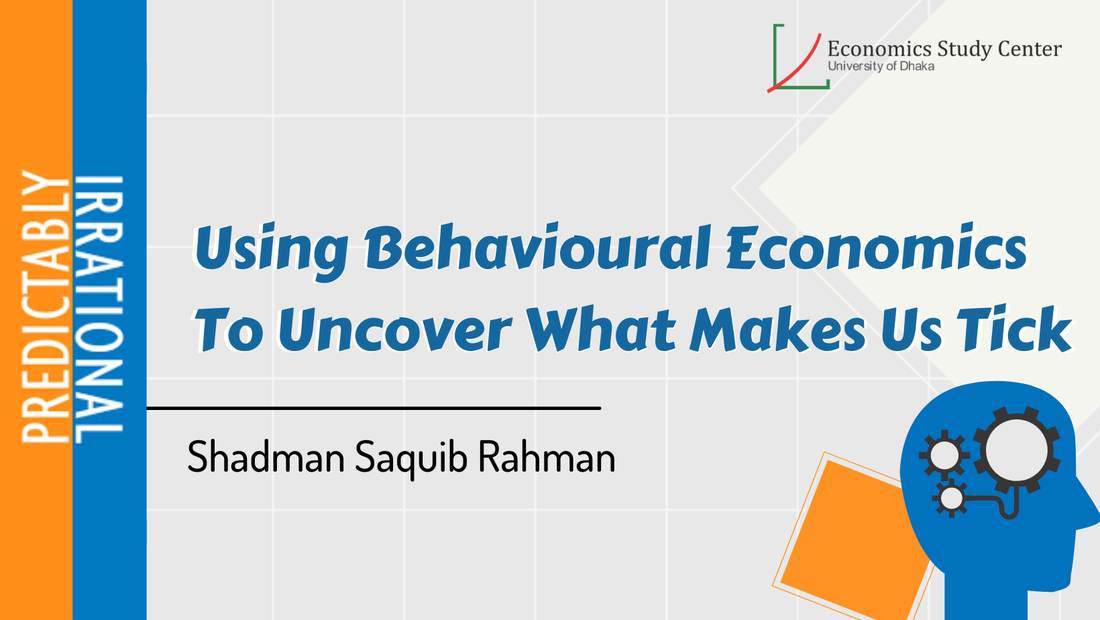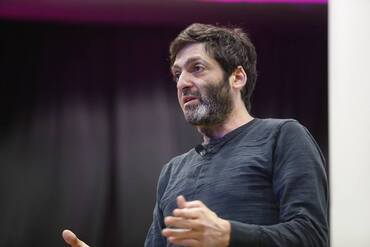ECONOMICS STUDY CENTER, UNIVERSITY OF DHAKA
|
Shadman Saquib Rahman Why do we struggle with procrastination, meeting deadlines or buying things that we don't need? Predictably Irrational: The Hidden Forces That Shape Our Decisions, is a book written by Dan Ariely about the countless systematic behavioural quirks we all (including the author) have which subconsciously causes us to repeat the same mistakes. By describing the numerous insightful experiments he had conducted regarding human behaviour and decision-making and explaining its implications on our daily lives through fascinating anecdotes, the author hopes that we can learn from our systematic mistakes and be less ‘predictably irrational’. Each chapter of the book identifies a specific behavioural quirk through experimentation and anecdotes and is followed by a few key takeaways for us to apply in our own life. For example, in the first chapter, the author talks about the relativity of our decision making and how we subconsciously gravitate towards choices that are easier to compare. To illustrate this, imagine choosing between three travel packages, Paris with free breakfast, Rome with free breakfast and Rome without free breakfast. Personal preferences aside, the author shows that we are more likely to choose Rome with free breakfast just because it's easier to compare to the one without breakfast. This is known as the ‘decoy effect’ which businesses often use to influence customers into buying a particular package. To demonstrate this effect, the author suggests a sinister tactic for better dating success: have a similar-looking but less attractive friend accompany you on dates or social events. Ariely argues that even though standard economic theory assumes that we make decisions based on our likes and dislikes (i.e. rationally), in reality, our decisions are largely arbitrary and based on memory (for example we don’t remember the past prices of goods and thus don’t notice small changes). Through his experiments, the author showed that we randomly assign base prices to different goods and services and use that as a frame of reference for future purchases. For example, Italian diamond dealer, James Assael was able to create demand for black pearls by ‘anchoring’ them to the finest jewels in the world in fashion magazines. The book then goes on to explain why we love free stuff and how businesses tempt us to buy more than we planned by leveraging this preference. In another chapter, the author distinguishes social and market norms that dictate how we handle/make our social transactions. For example, while a lawyer may refuse to work for a discounted fee, she/he will be more willing to do it for free for a social cause. In that light, businesses can induce greater loyalty by offering benefits and gifts to employees rather than doling out bonuses of a similar amount as it appeals to social norms. Notably, Ariely tries to illustrate how our decisionmaking is clouded when we are sexually aroused to shed some light on the cause of date rape, teen pregnancies and STDs. Specifically, he shows how substantially participants were willing to engage in risky, reckless and illegal behaviour when they were aroused as opposed to when they were not. Later, the author presents his findings on self-control and concludes that we are less likely to procrastinate or miss deadlines if we attached real consequences for missing them (self-regulate) or made precommitments. In a similar vein, the author points out how we fight to keep our options open despite losing out in the long run by not focusing. The solution that he suggests: consciously close doors so that we don’t waste time with our indecision. Furthermore, Ariely maintains that physical presentation, the type of information and even the way information is presented can drastically alter our perception of different things. For example, in the book, participants would respond more favourably about a particular drink simply because it was presented in a fancy container. Similarly, as a result of the ‘placebo effect’, participants stopped feeling pain from electric shocks after they were ‘primed’ with information about a powerful painkilling tablet (actually vitamin C tablets). Ariely also uncovers that most individuals will cheat if they are given the opportunity but by a small amount. Similarly, individuals are more likely to steal or cheat when the transaction is a step removed from actual money. This simultaneously explains the motives behind most whitecollar crimes and why we don’t feel guilty stealing a pen from the office. First published in 2008, this book was one of the first to discuss and introduce behavioural economics and how it differed from the principles of traditional economics (which assumes we are perfectly rational). By highlighting how predictably irrational we are, Ariely shows us the path to developing not only ourselves but also better economic models that account for human error. Thanks to the author’s engaging style of writing, I found the book quite fun, insightful and engaging. Author
1 Comment
Samin Luban
3/23/2021 07:25:17 pm
Very good write up shadman!
Reply
Leave a Reply. |
Send your articles to: |



